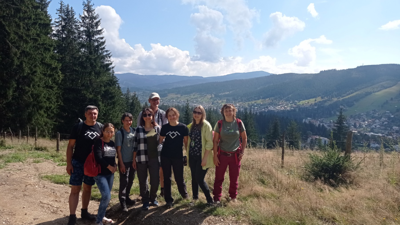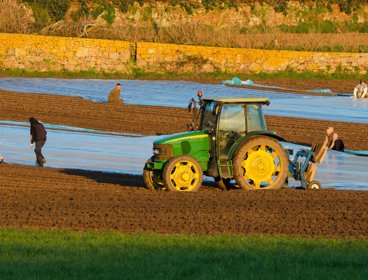Each month we are spotlighting recently published research from one of the Society’s leading international journals: Area, The Geographical Journal, Transactions of the Institute of British Geographers, and Geo: Geography and Environment. This month we’re featuring a commentary article from Transactions, which explored how Ukrainian geographers are using digital technology to adapt during war.
Digital technology and the option to stay during war
Russia’s invasion of Ukraine recently surpassed 1,000 days and shows no signs of abating. This war has taken a significant toll on Ukrainians, with millions of lives interrupted, uprooted, or lost. Routines of daily existence have been forced to alter, including the delivery of higher education.
Prior to the war, fieldwork was central to geographical education in Ukraine, providing students with inspiration, motivation and essential professional skills. Using digital tools, field trips and research are now being conducted in a hybrid format, allowing geographers to maintain a connection with their field sites when they cannot physically be there.
Ukraine is the biggest European country, so we have a huge diversity of beautiful landscapes. We need to preserve this space that is valuable for us as Ukrainians, but also as an environment where we can be peaceful, intelligent people. As physical geographers, fieldwork helps us to understand the processes that are going on in Ukraine. Through virtual tools, we have the option to stay.” Dr Dariia Kholiavchuk
The commentary published in Transactions emerged from a collaboration between Dr Simon Hutchinson and Dr Elizabeth Hurrell, who are based in the UK, and four Ukrainian geographers, Dr Kateryna Borysenko, Vladyslav Popov, Dr Dariia Kholiavchuk and Dr Yana Popiuk. It arose following a virtual summer school hosted by the University of Suceava in Romania and funded by the Central European Initiative.
Using digital technology, from east to west Ukraine
In eastern Ukraine at Kharkhiv National University, Kateryna and Vladyslav are using digital technologies such as Google Earth and ThingLink, a platform which collates multiple media sources. ThingLink have been particularly supportive in allowing partner universities in Ukraine to access their platform. Combining these technologies, they have delivered virtual field trips for their students.
Alongside this, Kateryna and Vladyslav have designed and produced their own innovative digital tools, including 3D-printed remote sensing devices. These devices are sent into the field where they record and report back meteorological data such as humidity levels and atmospheric pressure. Using such devices, research can now be carried out remotely.
Across the country at Yuriy Fedkovych Chernivtsi National University, Dariia and Yana are also using digital technologies to adapt teaching and research. One project they are contributing to is the digitisation of the National Museum of Natural History collections. As a site where students historically had courses in geology and palaeogeography, the digitisation of the museum’s collections enables education to continue.
Alongside these efforts, they are working to create virtual guides to precious geo sites, locations that geologically capture the Earth’s evolution. Once completed, these virtual guides will be uploaded to ThingLink, allowing researchers around the world to continue working with Ukraine. From east to west Ukraine, digital technology is enabling geographers to adapt the delivery of higher education, ensuring its resilience for the next generation.
We want to show the world that we can preserve our education system. With the help of digital tools and virtual field trips, geography students can get a quality education. With this education, future geographers can help fix our damaged environment.Vladyslav Popov
The opportunities and challenges of digital technology
Digital technology has also equipped Ukrainian geographers with tools to monitor the impacts of war in areas unsafe for physical access. Vladyslav and Kateryna are using remote sensing to monitor forest fires on the frontline, whilst Dariia and Yana are working to identify dangerous minefields using GIS.
For Ukraine, it's really important to have digitalised knowledge because for many years to come, we may not have physical access to big areas of the country. Virtual tools help us to understand what is going on and how to monitor it.Dr Dariia Kholiavchuk
Digital technology is currently enabling geographical higher education to continue in Ukraine. However, it is not without its limitations. Teachers are facing burnout, and their students are craving in-person contact and connection. In the future, these digital materials will be used to supplement and enrich, not replace, in-person field trips and research.
We are human, so we need that physical presence. Our students say that they are depressed and burnt out because they can't meet us physically. There is also a lot of fear. We are frightened 24 hours a day about what to expect next.Dr Dariia Kholiavchuk
International cooperation for a hopeful future
International cooperation is essential for strengthening the resilience of higher education in Ukraine. Partnerships between Ukrainian universities and institutions across the globe will facilitate the sharing of technical support, aiding the future development of digital technology.
We hope that foreign universities will be able to help create and share digital materials and tools and organise virtual exchanges.Dr Kateryna Borysenko
Not only is technical support important, but so are opportunities to come together virtually as an international research community. A supportive international community is both key to the resilience of Ukrainian higher education and for those who are working tirelessly to continue delivering it.
We are still here because of international support. The international community keeps us going. Virtual tools allow us to be part of the international community and to say to the world, we are still here.Dr Dariia Kholiavchuk
Next steps
The authors of this paper are continuing work on a range of projects relating to digital technology and resilience. Dariia and Yana are contributing towards a project aiming to create a trans-border Carpathian Peace Park, initiated by Dr Marcel Mindrescu at the University of Suceava. Vladyslav and Kateryna are continuing to monitor the effects of forest fires linked to the war. In the UK, Simon and Elizabeth are working to amplify the voices of Ukrainian geographers in the international research community, at a time where cooperation is paramount.
You can find out more about virtual fieldtrips in Ukraine in this geovisualisation on the topic.



